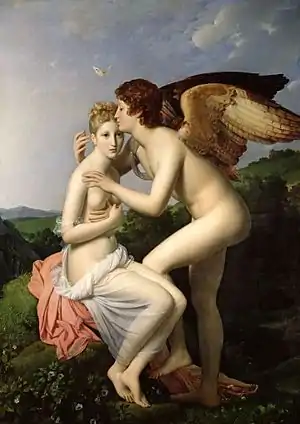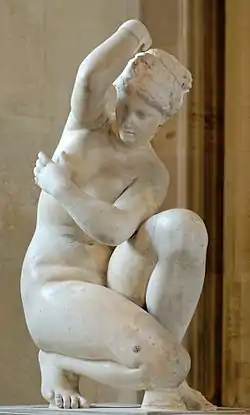| Subject classification: this is an Philosophy resource. |

This is a short outline of "Peri Psyche", an attempt to provide one summary sentence for each paragraph in the Lawson-Tancred translation.
Key: B1C1p1 means Book 1, Chapter 1, paragraph 1.
Note: the word "psyche" (ψυχή) is left untranslated so as to let the reader attempt to discover what Aristotle meant by the word.
Book One
Chapter 1
B1C1p1: Aristotle was thinking of “psyche” as a fundamental principle of living things and an important part of the natural world.
B1C1p2: Aristotle points out the fact that it is not clear how best to try to understand the fundamental principles of living things.
B1C1p3: Aristotle notes that while many people try to understand the fundamental principles of living things by thinking about people, we should not ignore the fact that there are many types of living organisms and we can explore which types of organisms share the various human abilities such as perception and thinking.
Chapter 2
B1C2p4: Aristotle asks if “psyche” is something that only exists as a feature of a living organism or is it something that can exist independent of a particular body and concludes that we have no way of studying “psyche” outside of the context of the actual physical bodies of living things.

B1C2p1: Aristotle identifies self-generated movement and perception as two key aspects of “psyche” and reviews some previously published ideas about how “elements” such as fire might make it possible for living things to produce movement.
B1C2p2: Aristotle mentions past discussions by people such as Anaxagoras about the idea that mind or “psyche” might be the source of self-generated movement produced by living things.
B1C2p3: Aristotle reviews the Platonic theory that perception and knowing have a fundamental geometrical basis in that the “elements” are formed from numbers and the elements combine to make perception, knowledge and mind.
B1C2p4: Aristotle moves from the specific suggestion that the “psyche” is in some fundamental way reducible to numbers to a general discussion comparing
1) the idea that the “psyche” is non-physical
to
2) the alternative that if it is physical then it must be composed of the most disembodied of the “elements”: fire.
B1C2p5: Aristotle mentions the theories of several people including Democritus who had tried to account for “psyche” in terms of special components such as a type of atom that is “productive of motion” or one of the “elements” such as air or water.
B1C2p6: Summarizing the views of others, Aristotle concludes that many commentators have associated “psyche” with the self-generation of movement, perception, cognition and the idea of an existence beyond the physical.
Chapter 3

B1C3p1: Having outlined the ideas of others, Aristotle begins his analysis by asking if generation of movement is something that is fundamentally associated with “psyche”, or if movement might just be something that we mistakenly attribute to “psyche”.
B1C3p2: Aristotle starts by noting that anything intimately involved with movement must exist in space and be subject to some force that controls the movement.
B1C3p3: Aristotle suggests that if the “psyche” is the source of movement of the bodies of living things then we should wonder if the “psyche” itself can move, say out of and then back into a dead body.
B1C3p4: Aristotle asks if “psyche” produces the motion of living things by means of thought and the making of choices or if “psyche” is itself moved in response to perceptions.
B1C3p5: Aristotle explores the theory of mind and motion from the Timaeus, raising several objections to Plato’s analogy between the movement of heavenly bodies and the production of movement and thought in living things.
B1C3p6: Aristotle concludes that all dualistic theories that attribute self-generated motion of the bodies of living things to the motion of the “psyche” are not adequate because they explain nothing about how the “psyche” interacts with the body nor how motion of the “psyche” is transferred to motion of a body.
Chapter 4
B1C4p1. Introduction to the theory that “psyche” is in some way explained as a mixture of components that produce a balanced system.
B1C4p2. Aristotle suggests that a theory of balance is more suited to health than to supposed functions of “psyche” such as the production of movement.
B1C4p3. Aristotle also expresses doubt that perception and thought can be produced by some correctly adjusted balance of component parts.
B1C4p4. Aristotle wonders if it is the case that is “psyche” is a correct ratio of components, that what prevents that ratio from being produced multiple times in several different places in the same body.
B1C4p5. Rather than say that "psyche" moves, Aristotle suggests that perception might involve a movement of something towards the “psyche” and that memories might come from the “psyche” and help drive motion in the body.
B1C4p6. Aristotle discusses the idea that thought might be based on a fundamental dualism of an eternal part that is associated with a body (and possibly cannot be destroyed) and a second part that depends on the health of the body and can decline with age as the body (a vehicle for the "psyche") decays.
B1C4p7. Aristotle suggests that we do not need to assume that the “psyche” itself moves and he concludes in particular that it is silly to say that “psyche” is a self-moving number.
B1C4p8. Aristotle expresses doubt that some simple atom can account for motion and “psyche”, asking what would keep all bodies from containing these atoms and having “psyche”.
B1C4p9. Aristotle concludes that neither some sort of special atom or some special number can account for the self-generation of movement in living things, let alone perception and reasoning.

Chapter 5
B1C5p1. Aristotle turns to consideration of the idea that “psyche” must be composed of the elements because it requires something made from the elements in order to perceive objects made from the elements.
B1C5p2. Aristotle dismisses the idea that “psyche” allows us to perceive “like by like” because it would seem to require that that “psyche” come equipped not just with all of the elements but also copies of the patterns and formulae that describe exactly how the elements exist in all objects we can perceive.
B1C5p3. Aristotle wonders how it would be possible for a “psyche” composed of all things to avoid being a complex substance that would have to fit into a body.
B1C5p4. Aristotle wonders, if “psyche” is produced by a composite of the elements, then why do all things composed of elements not have “psyche”.
B1C5p5. Aristotle makes the point that various living things have different abilities (only some move, breath or perceive) and wonders then how if being composed of the elements can account for “psyche”, how it would also account for differences between living things.
B1C5p6. Aristotle dismisses the idea that “psyche” is in every part of the universe, suggesting that if it were, then it would have to be homogeneous and unable to account for the different behaviors of different living things.
B1C5p7. Aristotle says that “psyche” is the source of growth, perception, thought, belief, appetite and desire and wonders what would hold all of the parts of “psyche” together if “psyche” itself has parts.
B1C5p8. Aristotle again mentions the fact that the bodies of some plants and animals can be divided into parts, each of which continue to live, suggesting that “psyche” can not be associated with any particular part of the body.
B1C5p9. Aristotle repeats the idea that plants have a kind of “psyche” that does not include perception.

Book Two
Chapter 1
B2C1p1. Aristotle introduces his own conceptualization of “psyche” as the fundamental organizing principle of potentially living things.
B2C1p2. As a general statement about all types of “psyche”, Aristotle suggests the formula that “psyche” is the fundamental organizing principle any body with organs.
B2C1p3. Aristotle insists that “psyche” is a substance that is distinct from matter; that which is needed in addition to the matter of a living body.
Chapter 2
B2C2p1. Aristotle starts to define the parts of “psyche” by saying that plants only have the nutritive part (including a capacity for self-generated motion of growth).
B2C2p2. Aristotle lists other parts of “psyche” that only certain living things have (perception, pain, appetite, imagination, desire and intellect) and raises the question of if some of these parts might exist independent of a body.
B2C2p3. Aristotle indicates that each type of body has its own appropriate “psyche” (a particular “psyche” can not exist in just any type of body, say by moving between different bodies).
Chapter 3
B2C3p1. Aristotle raises the question of if all animals have imagination.
B2C3p2: Aristotle raises the question of why it is that there seems to be an ordered series of abilities in living things from nutritive (in plants) to perception (in animals) starting with touch as the most common with other senses like vision in some animals and imagination and reason the most rare.
Chapter 4
B2C4p1: Aristotle states his plan: to first examine each of the abilities associated with “psyche” (nutritive, perception, imagination and reason) and then identify the principle(s) general and common to them all.
B2C4p2: Aristotle notes that all living things obtain nutrients in order to reproduce.
B2C4p3: Aristotle identifies “psyche” as the cause of the behaviors of living things such the roots of plants growing down into the ground.
B2C4p4: Aristotle provides an outline of nourishment with reference to digestion of food and the production of heat.
Book Three
Your turn. Continue reading and add your summary comments here. This book turns more directly toward the question of man and the four different kinds of imagination.